By Jen and Hilary Bayer
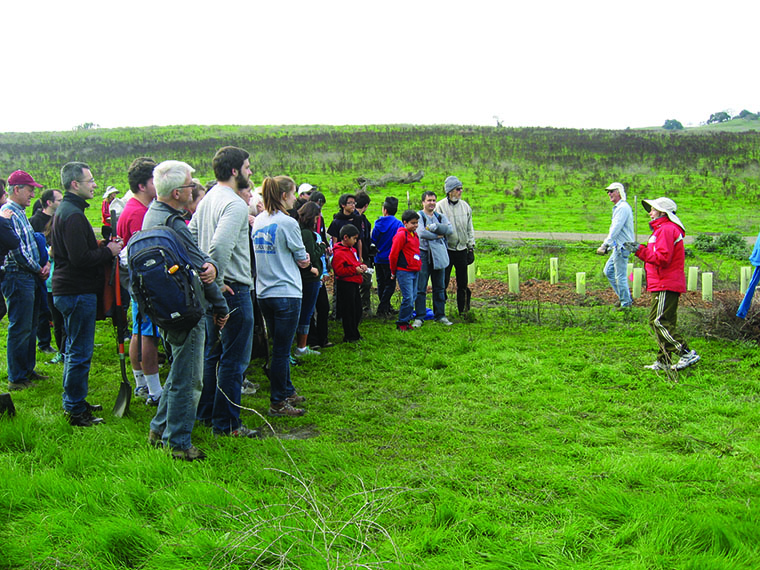
Second generation fellow Robin Bayer (aka mom!) manages our habitat stewardship, working to change hearts and minds as well as the landscape.
We’re 20-year-old twins born and raised in Magic, a residential service learning community. As we’ve grown older we’ve wondered increasingly about futures we might shape here and elsewhere.
Today about 20 Magic residents ranging in age from 15 to 83 share three detached homes on a half-acre just two blocks from Stanford University in Palo Alto, California. Each year hundreds of people in a larger service community volunteer, learn, and contribute through Magic to further common good.
Magic is rooted in an “almost comically archetypal and naive ’60s vision of peace and love.” Central to that vision, however, is an element many at the time found, and some still find, incongruous or unappealing. That element is commitment to science—behaviors by which we make better predictions. Magic founders shared a desire to learn together how to apply human ecology, which they term “science of the pertinent,” to be healthy, to cooperate, and to care for the Earth.
Leadership Structure and Decision-Making
In early years Magicians aimed to create a level social structure. Over time, those with longer tenure—currently 10 to 40 years—became a
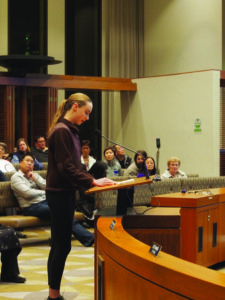
Hilary speaks on behalf of future generations at a city council meeting concerning neighborhood quality of life.
core group of “fellows” who embrace, “From each according to ability to each according to need,” in dealings with each other.
Fellows shoulder responsibility for strategic decision-making. They formulate community standards, manage Magic’s public service projects, and provide continuity.
Residents who stay for shorter terms—often linked to academic programs or career moves—retain greater personal autonomy, share day-to-day tasks like food service and cleaning, and organize outings and social events.
Over time we’ve codified a flexible “3-C” approach to decisions, weighing competence, past contribution, and commitment into the future as we listen to each other. Though fellows lead and guide, in some situations—purchasing and installing an electric vehicle charging station is a recent example—a relatively new highly qualified resident may wield more influence than all of them.
Generational Shifts of Leadership
During our lifetimes we’ve observed founders grooming potential future generations of leaders including us. Today David, 73, is stepping back. Jeff, 63, Robin, 52, and Hilary, 51, are transitioning to senior leadership.
Their ascendance is having a cascading effect. Andrew, 30, has lived at Magic for almost a decade, half of it as a fellow. He now coordinates
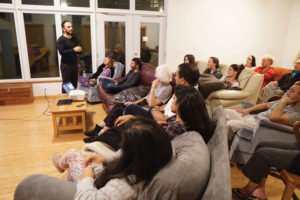
Resident Luigi Nardi hosts a screening of a documentary about his mountaineer brother.
community members in making labor contributions, something formerly in Hilary’s domain. A youthful Gen-Z cohort—Harper, 15; we, Jen and Hilary, 20—who’ve been growing into leadership from an early age also are finding new opportunities.
Though David remains active and others still seek his counsel, we often hear him say, “This is your decision; you’ll live with consequences far longer than I.” Implicit in such letting go is trust in younger Magicians’ competence and in our desire to ensure his well-being.
As we make these transitions we’ve encountered bumps in the road. Recently, just weeks after Jeff retired from his job in the solar industry with intent to engage more fully at Magic, he launched into planning a thorough renovation of our landscape. Other fellows wanted him to join in addressing what they considered more urgent matters. When David delivered that message bluntly, Jeff felt “shut down.”
In discussions that followed fellows examined David’s, Jeff’s, and others’ fearful behaviors: seeking control, projecting imagined slights, avoiding conflict. They analyzed deference, allegiance, and other group dynamics. They reassessed personal and shared goals.
Resolution included Jeff’s guiding others in planting six new fruit trees, his organizing Magicians to lay wood-chip-over-cardboard mulch to obviate need for annual weed suppression, and our deciding together a list of plants that we’re now installing as seasonal rains begin.
Watching fellows who’d lived and worked together for so long navigate this conflict, we became even more aware that the work of community is ongoing. When we stopped to think about it, we appreciated their commitment to science and loving.
Divide and Regroup
Four fellows have left Magic. Two remain close friends; another harbors ill-will. Jeff departed twice for eight or nine years to found another
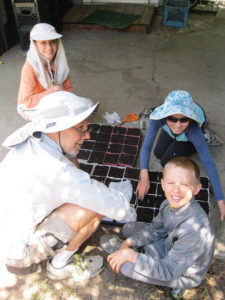
Senior fellow David Schrom helps Hilary, Jen, and Harper start seeds for their heirloom vegetable garden.
community and then lived with two successive partners. Even during these leaves he was a stalwart supporter and regular participant. He’s now been at Magic continuously the past 15 years.
Fellows’ continuing work to achieve harmony and their comings and goings are food for thought. Today we contemplate mostly imminent choices. Shall we stay at Magic or depart for college or other experience? How can we learn and serve here and elsewhere? In the future, we’ll likely draw on what we’ve learned watching fellows and other residents as we decide to whom we want to make what commitments.
A Recurrent Leadership Issue
By distinguishing between fellows and other residents we at Magic have explicitly defined a hierarchy. Some residents harbor visions of a more exact egalitarianism and want to realize those here and now. Others view our hierarchy as a way to preserve stability, be faithful to purposes mandated by Magic’s public service charter, and respect those who’ve labored decades to earn Magic’s reputation for service to common good and to fund purchase of homes we occupy.
Over our lifetimes tension between residents holding these differing views has waned. Residents express growing appreciation for fellows’ contributions, competence, and commitment. An ever larger fraction are here at least in part to learn how we’ve created and sustained Magic. Fellows devote more life to apprising prospective residents of Magic’s philosophical underpinnings, history, and current social structure. Today they provide applicants Magic’s orientation manual and other writings, and encourage them in interviews to think carefully about whether they’re comfortable with the fellow-resident distinction.
Still we sometimes misperceive how well we’ll live with this structure. In easy cases everyone acknowledges discord and cooperates to resolve differences or distance gracefully. In more difficult ones a dissident acts overtly, or worse covertly, to test community norms: removing shoes before entering, being respectful of others, keeping sinks and counters clear of dirty dishes, contributing labor cheerfully, on schedule, and to established standards.
In these circumstances fellows and residents who embrace the prevailing Magic ethos aim to assist outliers in recognizing that all benefit when we enthusiastically pull together or make a smooth transition to living less closely. We recall only a handful of the hundred or so residents with whom we’ve lived and who’ve since moved away who will receive any but a warm welcome if they return to visit.
Young Blood, New Ideas
Of course adherence to old ways in a changing world can be an impediment to successful adaptation. Fellows are assiduous in seeking
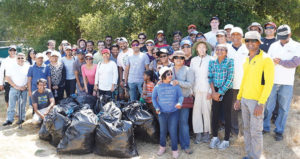
Second-generation Magic fellow Robin Bayer (first row, third from right) and 40 volunteers celebrate a successful morning fieldwork session removing noxious invasive plants from oak habitat.
evidence on which to base continuing evolution of Magic.
At Magic we provide a nightly common dinner for all residents and guests. For many years we left serving dishes available for latecomers. After a young resident who’d been here only a short time expressed concern about health risks and provided research to support his views, we began refrigerating leftovers promptly.
For more than 30 years we had signs on toilet seat lids requesting, “Gentlemen, please sit to pee.” Five years ago a 20-something resident suggested we change those to be less gender-specific. Fellows proposed, “Ladies and gentlemen, please sit to pee.” Younger residents responded with, “Friends, please sit to pee,” and that, plus a “Thank you” suggested by an elder, is what’s there today.
While leftover refrigeration and toilet seat lid sign changes may seem trivial, the latter, especially, lies within a realm where people today often generate more heat than light. With commitment to evidence, reason, and common good we resolved them amicably and to everyone’s satisfaction, and took advantage of younger generation knowledge and insight to honor better our commitments to health, cooperation, and stewardship.
Leadership by Example
From as early as we can remember parents emphasized the importance of what each of us did in every moment. We heard more times than we can count about the proverbial butterfly whose alighting on a flower triggers a series of events culminating in a devastating tornado a continent away.
Biking has turned out to be a way in which we’ve led from an early age. Magic fellows are dedicated bicyclists. We rode in a bike trailer, then in bike seats, then on trail-a-bikes until we began riding solo at three.
In the two years we went to school we biked every day, even cold, windy, rainy ones. When people said, “I can’t believe your parents make you do this!” fellows congratulated us for grabbing what advertisers pay for: attention to our message. Fifteen years later with the number of Palo Alto students biking to school doubled, we feel good thinking we may have played some part.
After we left school following first grade, we interacted more with Magic residents. When we were 11, we challenged two in their mid-20s to race us up a road that climbs 1300 ft. in three miles. After we won, one of them, a former Stanford pole vaulter, began training again to be able to ride with us.
As we grew older and paid more attention to adult conversation, we heard one after another Magic supporter or program participant compliment people at Magic for “walking the talk.” Leadership, we saw, is “showing a way by going ahead.” We were learning to “Be the change you want to see” by watching fellows do just that and emulating them.
Chop Wood; Carry Water
Everyone at Magic shares in maintaining and operating it. We and our brother have lent a hand for as long as we can remember, learning along the way and lifting responsibility from others.
As pre-schoolers we served by answering short-term residents’ and visitors’ questions, gardening, and cleaning. As we’ve gained more skills we’ve built and repaired, researched and taught. By the time we were teens each of us was cooking community dinner one night a week. Now when cooking we sometimes train new resident cooks.
We’ve also grown our roles in Magic’s public service projects. We started planting and caring for native oaks on local recreational open space when we were toddlers. Over the years we accumulated sufficient expertise to be regular crew members, then crew leaders, and now also spokespeople.
In 2018 we wrote an article for Pacific Horticulture describing Magic’s work with oaks, and a few months later we presented the project at an International Oak Society conference at UC Davis. After the conference a group of 40 traveled 100 miles to Palo Alto for a tour of Magic’s plantings and lunch at Magic, where they peppered us with questions about community living and the oak project. In moments like these we feel like fellows.
Questions and Choices
The transition to growing responsibility and leadership we outline here seemed natural and unfolded smoothly within Magic. For the past four

We, our brother, and three Magic fellows pose in front of a landmark mural with some of the surplus produce and baked goods we salvaged that week from a local farmers’ market and distributed to partner social service organizations.
years, however, we’ve thought more about how to continue it elsewhere as people have asked with growing frequency and intensity, “Where are you going to college? What will be your career?”
Magic and its immediate surroundings are populated by people with exceptional amounts of schooling, much of it within institutions with worldwide reputations. Most of these people assume that we’ll aim to attend famous colleges and graduate schools and enter one or another profession.
Watching peers strain to excel and “create a compelling story” to improve chances of admission to elite schools, and interacting with people who’ve cleared this hurdle one, sometimes several times, we wonder. Though we love to learn and to be around others who do, we’re surrounded by people at Magic and in the larger Palo Alto-Stanford community who help us learn. We’ve also the resources of the web. This seems like a lot, but do we need more?
People tell us we “must” have a college degree. We ask, “How can this evidence ability to contribute better than a record of effective work for common good?”
They tell us, “College is a great experience! Everyone should have it.” We look at overburdened college student mental health services and rising suicide rates and think, “Really?”
They say, “The world is becoming more cutthroat. You’ll fall behind unless you grab every opportunity.” We see how parents’ degrees have been tickets to privilege and ask, “How much privilege do we need to live well? How much can we contribute by sharing opportunity, and how much by striving for power and increasing our risk of being recruited into what Anand Giridharadas terms “the elite charade of changing the world”?
At the same time, we look with apprehension at a burgeoning human population, a shrinking resource base, and growing hazards including climate destabilization, nuclear weapons proliferation, and emergent and resurgent infectious disease. To live well how much shall we pursue narrow self-interest, and how much common good?
We wonder about opportunities at Magic, outside it, or in combination with it? Do we want to become fellows and fulfill that level of leadership and responsibility? With whom will we share it? In an era of increasing ecological volatility, will we and others want to move Magic? Or divide it? Or evolve it in ways we’ve yet to foresee? How will we realize aspirations to form sustained peer friendships? To contribute?
So far we’ve worked to keep options open. As we neared college age we took standardized tests, a new experience for us. We’ve completed a few college-level courses in classrooms and online. We’ve also continued to do things that we enjoy—music, art, recreational sports, being in nature—with little regard to their worth in the eyes of college admissions officers.
We’ve also initiated a public service project, Silicon Valley Barcode of Life (svbol.org). Through it we’re addressing what we consider to be one of the most pressing issues of our times: bioannihilation, the sweeping away of diverse life, from tiny insects to huge redwoods and whales, through extinction and massive population reduction.
In a little more than a year we’ve been able to inform hundreds of people about the importance of biodiversity, threats to it, and ways to protect it. We’ve learned and taught about how DNA “barcodes,” unique identifiers derived from short sequences of genetic material, are used to catalog and track biodiversity. And we’ve generated DNA barcodes for hundreds of species, some of which we’re the first to sequence.
Reflecting upon what we’ve learned and how we’ve served through SVBOL we ask, “How can we do this better? Can we grow it to be a right livelihood within or outside of Magic? Shall we do something entirely different? If we stop, who will do it?”
What Next?
We’ve enjoyed myriad opportunities to learn and to serve as we’ve grown up within Magic and participated in passing the torch. We also want
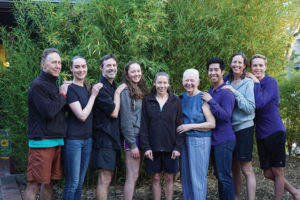
Here we are (second and fourth from left) with the fellows, our brother (far right), and our grandma (fourth from right).
to explore beyond it.
Whatever we do next, we’re grateful for what we’ve been given and we aim to use it to benefit all. Wherever we go we’ll carry lessons learned in a community where those who led made loving their goal and science their means.
Jen and Hilary Bayer have grown up at Magic (ecomagic.org). They love being outdoors enjoying and caring for nature. For more than 15 years, they’ve participated in Planting for the Second Hundred Years. Recently, they’ve initiated a biodiversity conservation project, Silicon Valley Barcode of Life (svbol.org). They’ve written an article for Communities previously (Coming of Age in Service Community), one for Pacific Horticulture (Magical Thinking), and letters to the editor published in the Palo Alto Weekly and Stanford Magazine. They’ve been featured in Palo Alto Weekly and Bike Intelligencer stories.
Excerpted from the Winter 2019 edition of Communities (#185), “Passing the Torch: Generational Shifts in Community.”
